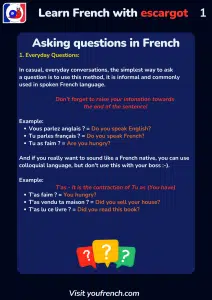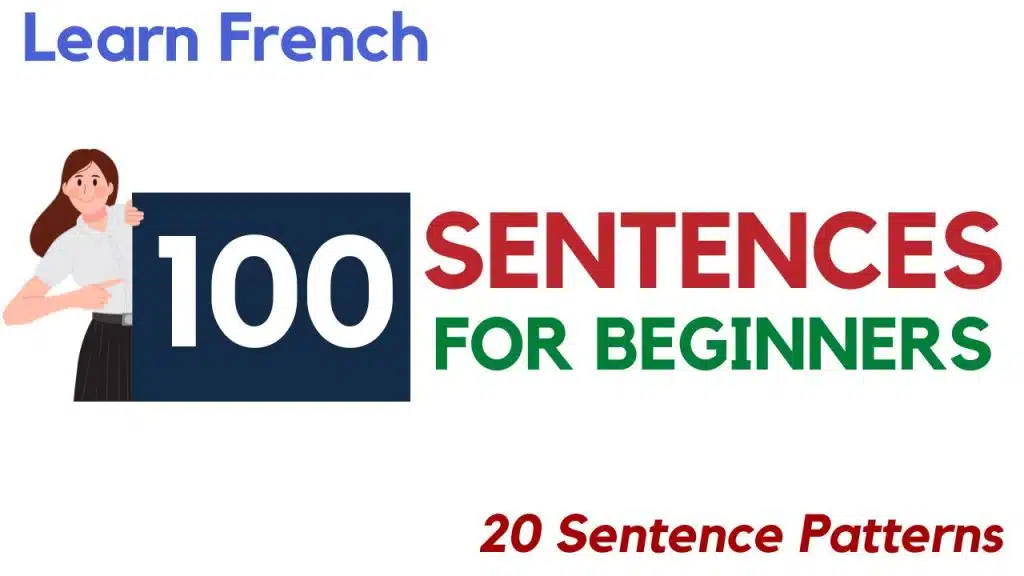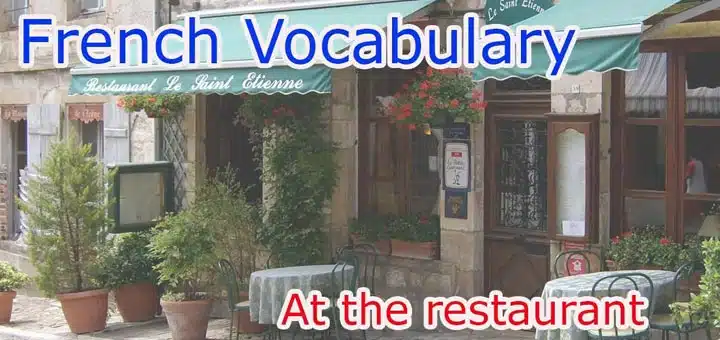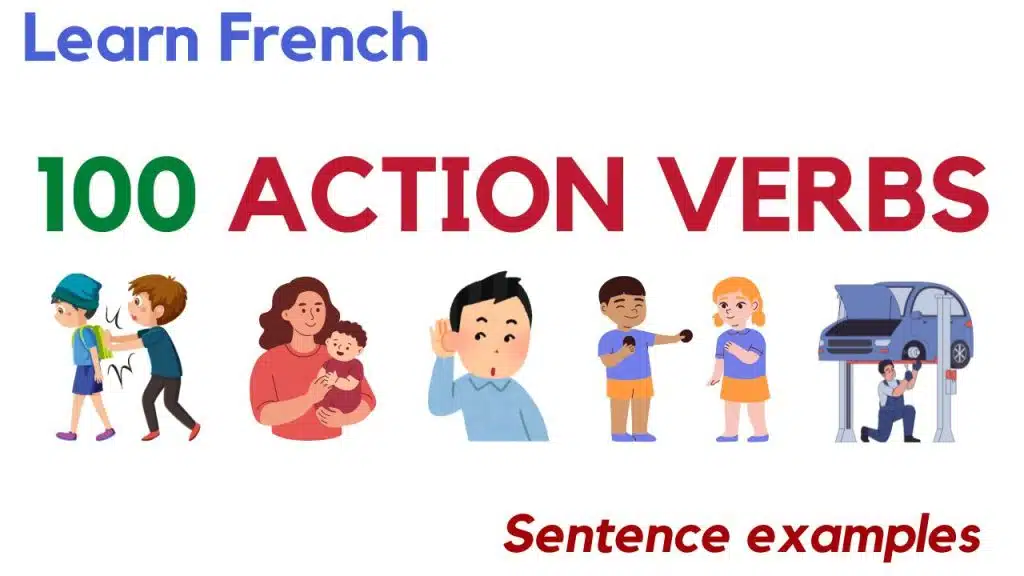How To Ask Questions In French
Being able to ask questions is essential for effective communication in any language. In French, there are four primary ways to ask questions, each with its own nuances and appropriate contexts. You can watch the video based on this lesson and download it in PDF format at the end of this post.
Need a French tutor, click here, and get $10 USD italki credits with a $20 purchase, credited to your student wallet within 48 hours.
1. Everyday Questions:
In casual, everyday conversations, the simplest way to ask a question is to use this method, it is informal and commonly used in spoken French language. Don’t forget to raise your intonation towards the end of the sentence!
Example:
- Vous parlez anglais ? = Do you speak English?
- Tu parles français ? = Do you speak French?
- Tu as faim ? = Are you hungry?
And if you really want to sound like a French native, you can use colloquial language, but don’t use this with your boss :-).
Example:
T’as – It is the contraction of Tu as (You have)
- T’as faim ? = You hungry?
- T’as vendu ta maison ? = Did you sell your house?
- T’as lu ce livre ? = Did you read this book?
T’es – It is the contraction of Tu es (You are)
- T’es malade ? = Are you sick?
- T’es rentré à quelle heure ? = What time did you get home?
- T’es pas venu ici depuis combien de temps ? = How long since you’ve been here?
When using interrogative words (like when, why, where…), they can go either in the middle or at the end of the sentence.
Example:
- Tu reviens quand à Paris ? = When are you coming back to Paris?
- Tu reviens à Paris quand ? = When are you coming back to Paris?
2. Using “Est-ce que”
“Est-ce que” is primarily used for yes-or-no questions and is quite common in both spoken and written French.
“Est-ce que” is pronounced [S keu].
Example:
- Est-ce que tu peux venir demain ? = Can you come tomorrow?
If you can come, you can reply:
- Oui, à quelle heure ? = Yes, what time?
- Ouais, bien sûr. = Yeah, sure.
If you cannot come, you can reply:
- Non, je ne suis pas libre. = No, I’m not free. (You can skip
“ne”to sound more like a native French speaker)
- Nan, je ne peux pas. = Nope, I can’t.
When followed by a vowel or an ‘h’, it takes elision and becomes “est-ce qu’il(s)” [S kil], “est-ce qu’elle(s)” [S kel], etc.
Example:
- Est-ce qu’il est norvégien ? = Is he Norwegian?
Then you can reply:
- Oui, Bjørn est norvégien. = Yes, Bjørn is Norwegian.
- Nan, il est suédois. = Nope, he’s Swedish.
- Est-ce qu’elle est malade ? = Is she sick?
Then you can reply:
- Oui, Marie est malade. = Yes, Marie is sick.
- Oui, je crois. = Yes, I think so.
It can also be used for “What” questions, so it becomes “Qu’est-ce que…”.
- Qu’est-ce que tu veux faire ? = What do you want to do?
- Qu’est-ce qu’il a dit ? = What did he say?
- Qu’est-ce qu’elles ont fait hier soir ? = What did they do last night?
3. Formal Questions: Inversion
Inversion is a more formal way to ask questions in French and is often used in writing or formal situations. In this method, the subject and verb order are inverted, placing the verb first.
If you are studying French to pass exams, it is essential you know how to form your questions using inversion.
Example:
- Parlez-vous anglais ? = Do you speak English?
- Parles-tu français ? = Do you speak French?
- As-tu faim ? = Are you hungry?
4. Tag Questions: “N’est-ce pas ?” and “Non ?”
When you are fairly certain the answer will be affirmative, you can use tag questions like “n’est-ce pas ?” or “non ?”.
Example:
- Tu es allemand, n’est-ce pas ? = You’re German, right?
- Tu l’as vu, non ? = You’ve seen it, haven’t you?
- Il le savait, non ? = He knew, didn’t he?
5. Most Common French Interrogative Expressions
Now let’s see some examples with common French questions words.
- Comment – How
Formal questions:
- Comment allez-vous ? = How are you?
- Comment vas-tu ? = How are you?
- Comment puis-je vous aider ? = How can I help you?
- Comment fonctionne cette machine ? = How does this machine work?
Informal questions:
- Comment tu t’appelles ? = What’s your name?
- Il s’appelle comment ? = What’s his name?
- Comment je peux t’aider ? = How can I help you?
- Comment tu le sais ? = How do you know?
- Où – Where
Formal questions:
- Où habitez-vous ? = Where do you live?
- Où souhaitez-vous aller manger ? = Where would you like to go eat?
- Où se trouvent les toilettes ? = Where are the toilets?
- Où est-ce que je peux trouver un taxi ? = Where can I find a taxi?
Informal questions:
- Tu habites où ? = Where do you live?
- Tu veux manger où ce soir ? = Where do you want to eat tonight?
- Ils sont partis où tes parents ? = Where did your parents go?
- Elles sont où tes clés ? = Where are your keys?
- Quand – When
Formal questions:
- Quand partez-vous en vacances ? = When are you going on vacation?
- Quand seras-tu disponible ? = When will you be available?
- Quand est-ce qu’ils arrivent ? = When do they arrive?
- Quand est-ce que vous repartez ? = When are you leaving?
Informal questions:
- Vous partez quand en vacances ? = When are you going on vacation?
- T’es bientôt disponible ? = Are you available soon?
- Ils arrivent quand ? = When do they arrive?
- Vous repartez quand ? = When are you leaving?
- Pourquoi – Why
Formal questions:
- Pourquoi es-tu en retard ? = Why are you late?
- Pourquoi ont-elles pleuré ? = Why did they cry?
- Pourquoi ne m’avez-vous pas appelé ? = Why didn’t you call me?
- Pourquoi Martin a-t-il démissionné ? = Why did Martin quit?
Informal questions:
- Pourquoi t’es en retard ? = Why are you late?
- Pourquoi elles ont pleuré ? = Why did they cry?
- Pourquoi tu ne m’as pas appelé ? = Why didn’t you call me?
- Martin a démissionné pourquoi ? = Why did Martin quit?
- Combien – How many, how much…
Formal questions:
- Combien de frères et sœurs as-tu ? = How many siblings do you have?
- Combien de langues parlez-vous ? = How many languages do you speak?
- Combien cette voiture coûte-t-elle ? = How much does this car cost?
- Combien de temps cela prendra-t-il ? = How long will it take?
Informal questions:
- T’as combien de frères et sœurs ? = How many siblings do you have?
- Tu parles combien de langues ? = How many languages do you speak?
- Cette voiture coûte combien ? = How much does this car cost?
- Ça va prendre combien de temps ? = How long will it take?
- Qui – Who
Formal questions:
- Qui est votre acteur français préféré ? = Who’s your favorite French actor?
- Qui est-ce que tu invites à la fête ? = Who are you inviting to the party?
Informal questions:
- C’est qui ton acteur français préféré ? = Who’s your favorite French actor?
- T’invites qui à la fête ? = Who are you inviting to the party?
- À quelle heure – At what time
Formal questions:
- À quelle heure arrivent-ils ? = At what time do they arrive?
- À quelle heure le restaurant ouvre-t-il ? = At what time does the restaurant open?
Informal questions:
- Ils arrivent à quelle heure ? = At what time do they arrive?
- Il ouvre à quelle heure le restaurant ? = At what time does the restaurant open?
- Method 1: Tu as froid ? T’as froid ?
- Method 2: Est-ce que tu as froid ?
- Method 3: As-tu froid ?
- Method 4: T’as froid n’est-ce pas/non ?
Download the lesson in PDF format
I hope this lesson was useful for you, you can also watch the video I did about asking questions in French if you prefer. If you have any questions, please leave a comment.
Need a French tutor, click here, and get $10 USD italki credits with a $20 purchase, credited to your student wallet within 48 hours.
Conclusion
Understanding these different ways to ask questions in French will greatly enhance your ability to communicate effectively. Start with the simplest methods for everyday use, and gradually incorporate more formal structures as you become more comfortable with the language. Happy learning!






Comment puis-je formuler une question en français de manière appropriée dans des situations formelles et informelles? Quelles sont les différentes façons de poser une question en français, que ce soit en utilisant l’inversion du sujet et du verbe, en ajoutant simplement un point d’interrogation à la fin d’une phrase déclarative, en utilisant des expressions comme “Est-ce que” ou en utilisant l’intonation montante? Pouvez-vous me donner des exemples concrets pour illustrer chacune de ces méthodes? Enfin, où puis-je trouver des ressources gratuites sous forme de PDF ou de vidéos pour m’aider à améliorer mes compétences en matière de questionnement en français?”,
Bonjour, je pensais que mon article répondait aux questions que vous avez posées dans votre message. Il y a également un lien vers ma vidéo et un PDF gratuit. Pour trouver d’autres vidéos, il suffit de chercher sur YouTube, et pour les PDF, cela peut normalement se trouver en cherchant sur Google.
Comme indiqué dans l’article, en français, il existe plusieurs manières de poser des questions, que ce soit dans un contexte formel ou informel, et chacune est adaptée à différentes situations. Voici un aperçu des méthodes principales et des exemples pour mieux comprendre :
1) L’inversion du sujet et du verbe : Souvent utilisée dans des contextes formels, cette méthode est idéale pour poser des questions polies.
Exemple : “Avez-vous un rendez-vous demain ?”
2) L’utilisation de “Est-ce que” : Cette structure rend la phrase interrogative sans besoin de changer l’ordre des mots. Elle convient bien aux situations informelles comme formelles.
Exemple : “Est-ce que vous avez un rendez-vous demain ?”
3) L’intonation montante ou la phrase déclarative avec un point d’interrogation : Très courante à l’oral et adaptée aux contextes informels, cette méthode consiste à poser une question en gardant la structure d’une phrase déclarative, en montant la voix à la fin. Elle peut aussi indiquer de la surprise ou demander une confirmation.
Exemple : “Tu as un rendez-vous demain ?”
Votre niveau semble déjà très bon ! Si vous n’avez pas utilisé Google Translate pour rédiger votre message, j’imagine que vous maîtrisez déjà bien la langue française.